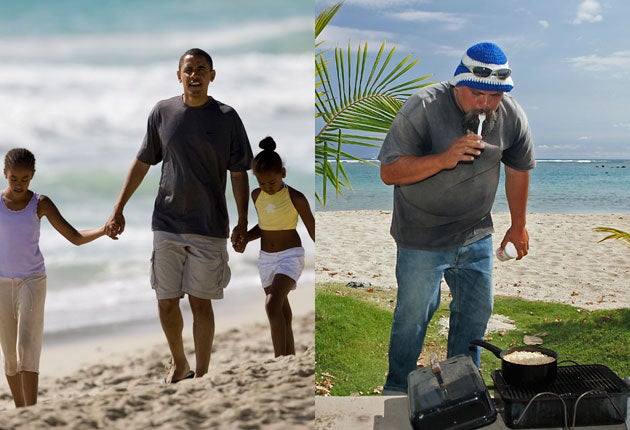Beverly Paracuelles wakes up each morning to palm trees, golden sands, and azure tropical seas. She spends her days wandering along the world-famous beaches of Oahu's northern shore. But don't go telling her that life is a dream.
Home for the 54-year-old former nursing assistant is neither one of the ocean-view mansions, nor the $600-a-night hotel rooms which dot Hawaii's most populated island. Instead, it's a battered Toyota van in which she must eat, sleep, and store all of her worldly goods.
"I've lived here for three years now, since I lost my job, and the depressing thing is that I can't see how things are going to get much better," she says.
Paracuelles is one of the more than 4,000 homeless people, out of a population of around 950,000, who contribute to Oahu's unwanted status as one of the street-sleeping capitals of America..
Despite its "aloha" reputation, Hawaii currently has the third-highest ratio of homelessness of any state in the nation, behind Oregon and Nevada. Since the number of Americans living below the poverty line rose above 15 per cent last week, the problem here, like elsewhere, seems likely to get worse.
A recent study by the research firm SMS found that 96,648 Hawaiians are now members of the "hidden homeless" community, a demographic which contains people squatting, living in temporary accommodation, or staying with friends or family members. Another 262,000 people – a staggering one in five Hawaiians– are classed as being "at risk" of homelessness. Beggars throng the traffic lights of Honolulu, the city of Barack Obama's birth.
The problem has not escaped Hawaii's ruling class, who are acutely aware of its potential to damage the "tropical paradise" reputation on which the state's lucrative tourist industry relies. Last year, local politicians narrowly failed to back a highly controversial plan to offer homeless people from other parts of the US a free one-way air ticket home.
Debate over alternative solutions is now gaining increased urgency in the run-up to November's Asia-Pacific Economic Co-operation (Apec) summit, which will draw 21 heads of state and hundreds of business leaders to Honolulu. In April, Hawaii's Governor, Neil Abercrombie, unveiled a "90-day plan" to reduce homelessness before the big event. But the 90 days brought little in the way of visible change.
Homeless advocates are now concerned that officials are planning to conduct intense "sweeps" of Hawaii's homeless encampments in the run-up to the Apec summit, clearing them from the streets in order to hide the scale of their problem.
Governor Abercrombie has repeatedly denied the existence of such "sweeps", saying that it is not a crime to be homeless in Hawaii. Last week, the Honolulu Star reported that state officials had also testified before the legislature that none was being organised.
But try telling that to Paracuelles. This month, local sheriffs arrived at the beachside park in the town of Hale'iwa where her car is stationed and served an eviction notice. She and 40 other residents were told that if they are not gone by 4 October, they'll be forcibly removed.
"I've no idea where I'll go," she says. "Probably the next place with space. We've decided, as a group, to stay close to the beaches and stay together. There's power in numbers, and safety."
Subscribe to Independent Premium to bookmark this article
Want to bookmark your favourite articles and stories to read or reference later? Start your Independent Premium subscription today.


Join our commenting forum
Join thought-provoking conversations, follow other Independent readers and see their replies